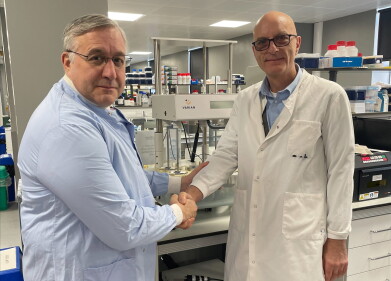News
UK – Malaysian Joint Efforts to Tackle Global Challenges
May 04 2019
Researchers at the UK’s Scientific Technology Facilities Council (STFC) are collaborating with Malaysian academics on projects that will both develop scientific capabilities and the research potential of Malaysian science in helping to discover new answers to some major scientific challenges. The projects have been funded via the Newton-Ungku Omar Fund, a partnership between the UK Government and Malaysia, which aims to develop science and innovation to promote the economic development and welfare of Malaysia.
STFC Executive Director for Programmes Professor Grahame Blair, said: “It is great to be forging a new international scientific partnership with Malaysia. “These projects will undoubtedly contribute a great deal to our mutual science programmes and at the same time allow all of the collaborators to benefit from each other’s specific expertise. I look forward to seeing the research develop.”
One such global science project is the Deep Underground Neutrino Experiment (DUNE) that will study neutrino properties and also look for events such as nucleon decays in a bid to understand how the Universe came to be made of matter. The University of Sheffield will lead a team to use machine learning to develop a method for spotting potential nucleon decay events against a background caused by cosmic-ray muons. They will be working with simulated data, as well as the data collected by prototype experiments, such as ProtoDUNE and the Short-Baseline Near Detector. Academics and PhD students from Malaysia will be trained in the areas of particle physics, data intensive science and machine learning techniques applied to complex particle physics problems.
In another funded project, Malaysian academics, with support from University of Manchester, will be looking at how to train computers to sift through the tens of thousands of images that come from modern astronomical instruments to find the pictures of interest. Although computers have the ability to look at images quicker than a person, they need to be taught what they are looking for – which is where the Malaysian academics will use their expertise in image classification and deep learning.
The Coherent Muon to Electron Transition (COMET) Experiment is being built in Japan to study physics beyond the Standard Model. Top scientists from Malaysia will also work with researchers from Imperial (ICL) on the preparations for the experiment, real data-taking and the physics analysis of the data.
Nearly £800,000 has been awarded to the projects, which will run until early 2022.
Digital Edition
ILM 50.2 March 2025
March 2025
Chromatography Articles - Effects of small deviations in flow rate on GPC/SEC results Mass Spectrometry & Spectroscopy Articles - Waiting for the present to catch up to the future: A bette...
View all digital editions
Events
Apr 02 2025 Saigon, Vietnam
Apr 09 2025 Tokyo, Japan
Apr 22 2025 Hammamet, Tunisia
Apr 22 2025 Kintex, South Korea
Analytica Anacon India & IndiaLabExpo
Apr 23 2025 Mumbai, India



















